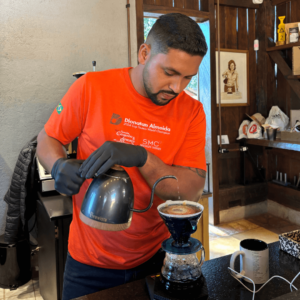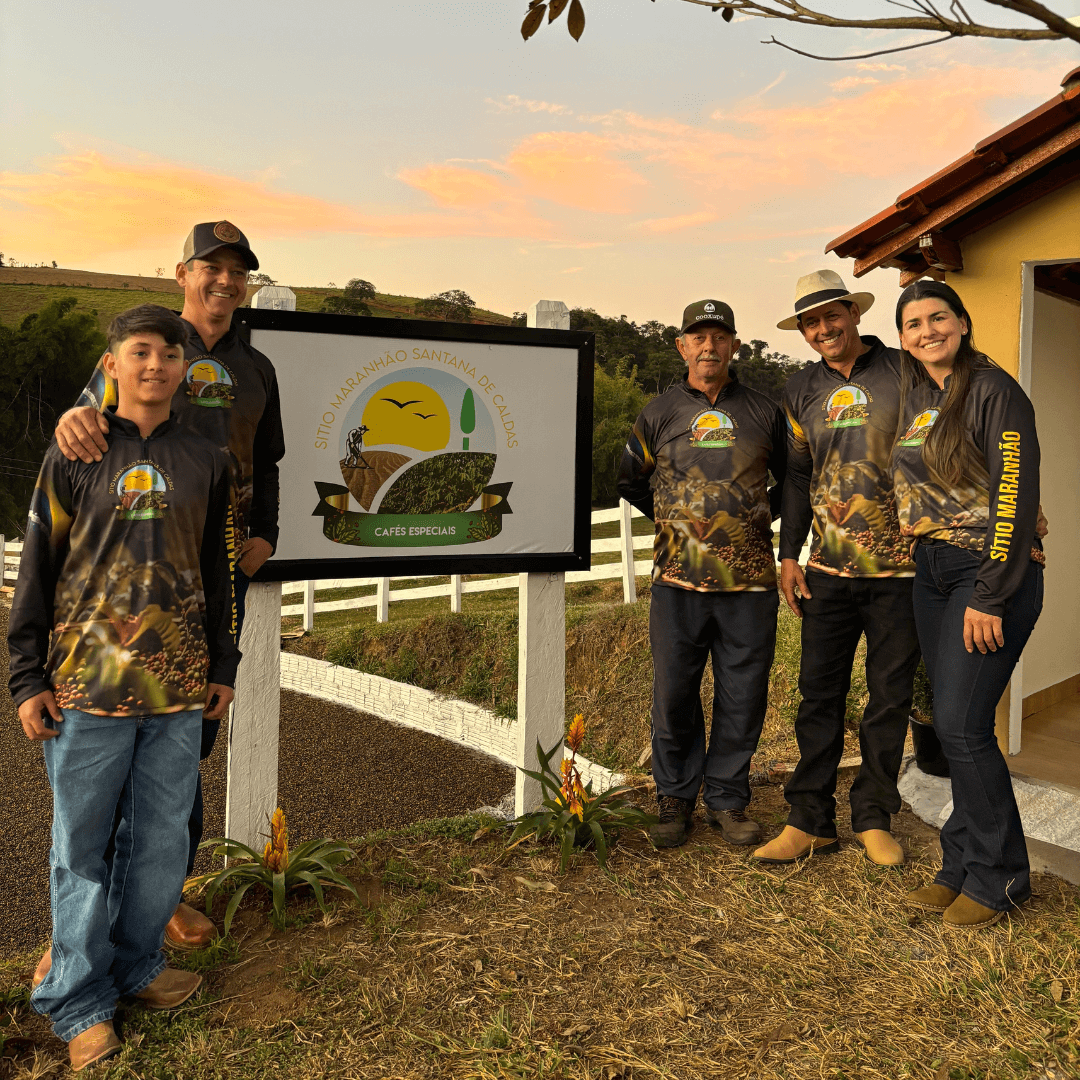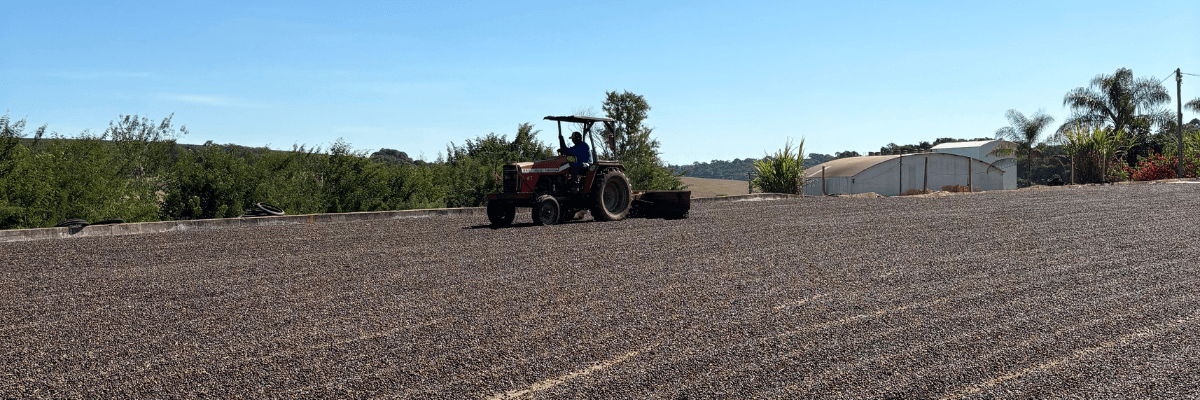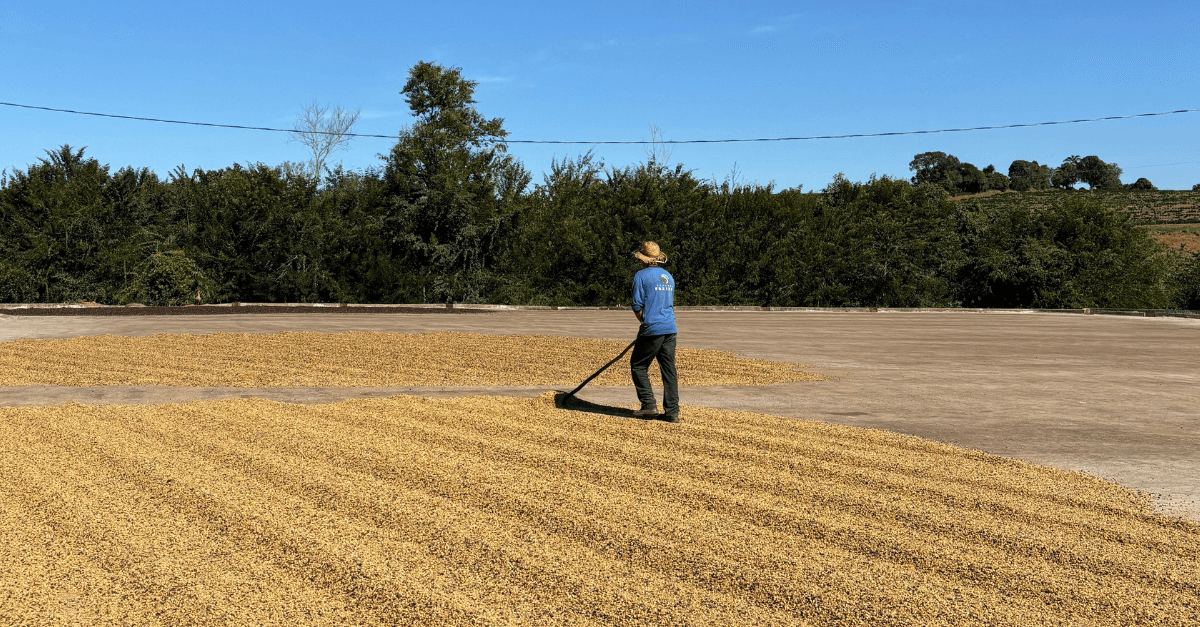Welcome back to part two of our coffee origin trip in Brazil! We travelled through the South Minas region, visiting two farms and the COCARIVE headquarters in the first part of our trip.
Now, we find ourselves starting off in the charming town of Três Pontas. We will then travel onto Guaxupé, where we will visit the cooperative SMC and explore several more specialty farms.
One of these farms is particularly special to us as it is the source of our very own Brazilian beans that go into our Mestizo blend. Keep reading as we dive deeper into the heart of Brazil’s coffee culture and share the stories behind these exceptional beans.



Fazendas Caxambú & Aracaçú
We headed off on a two hour journey to Três Pontas, to visit Ucha, Aracaçú farm owner and head of the BSCA. Very special to this farm is Dionathan Almeida who is the 2024 World Cup Tasters Champion – the first from Brazil.
We were immediately greeted by lots of hugs from Ucha and freshly brewed coffee from Dionathan. Who was born and raised on a neighboring farm and began working in post-harvest processes at Fazenda Caxambú & Aracaçú. He wanted to be part of every step and wanted get the best out of the coffee. In 2015, Ucha asked if he wanted to learn more about cupping and roasting and one year later, he was responsible for quality control of the harvest.
In 2024, he won Cup Tasters Championship in Brazil and then went onto represent Brazil in Chicago, taking home the crown. Ucha and her team have immense pride in Dionathan and his achievement.
He held a cupping session for us with some ‘Champion Selected Coffees’ including a range of varietals and processes; icatú, catuai, rubi, mundo novo, arara and bourbon.

After copious amount of coffee, we were ready to explore each stage of the coffee processing journey.
From seeing the harvesting process which is 80% mechanized and 20% handpicked. To experimental coffee fermentation processes and drying methods. Even right down to where the beans rest in a lowlit room with classical music being played 24/7. Ucha was a lecturer in psychology in a nearby university and believes the coffee ‘beings’ went through a stressful process and so wants to de-stress them before they head out for export.
Speaking of music… as the sun set over the Três Pontas mountains that evening, we had a little sing-song prompted by Ucha and her new lyrics to Brazilian nusery rhyme ‘Bom Dia’!

Sítio Tres Barras
Originally owned by Manassés’ grandfather, back in the 1940s, the primary crop was potato, onions and carrots. Dirven by his own personal passion for coffee, José Caetano planted around 5,000 coffee trees in the 1950s. Due to unsatisfactory yields, the coffee venture was halted and not pursued any further. Until 2001 when Manassés’ father, Artesio, decided to revive their coffee venture.
We explored Manassés’ 12 hectares on the back of his tractor. Checking out the many different varietals he is growing, including ‘tupi’ which we had never seen before.



Tupi has high pest-resistant traits and higher density than other varietals in Brazil – it also very sweet and we found ourselves munching on the coffee cherries as we walked around the farm. But we managed to save some room for dessert, as Manassés and his son, had prepared pão de queijos, lots of cakes and of course cachaça to finish!
Sítio Maranhão
Another humble and welcoming experience at Sítio Maranhão, where we were greeted by the entire Betti family.
The journey of this farm began with the grandfather, who started with just 4 hectares and has impressively expanded it to 10 hectares through dedication and hard work.
The entire Betti family is deeply involved in the farm’s operations, with the two wives, Jessica and Cleissimara, playing pivotal roles in post-harvest. They are both part of SMC’s Donas Do Cafe project. An inspiring female empowerment initiative that brings women to the forefront of the business, breaking into the specialty coffee market and showcasing their exceptional skills and passion.
Sitio Maranhão stands out not only for its high-scoring coffee, but also for the evident pride and passion the Betti family pours into every aspect of their produce.
We hopped into a cart on the back of the tractor and went up the steep hills of their 10 hectares to explore the different varietals they have on site, but also the stunning views and even the waterfall they have within their farm.
We came back to their family home where the family had prepared a huge spread of more pão de queijos and other treats. Their Donas Do Café blend was also there which we brewed and tried – delicious!

Fazenda Faxinal
After our two family farm visits, we got to experience the opposite end of the scale and visited Fazenda Faxinal – a commercial farm of over 1000 hectares. Hernane Souza currently manages the farm which is 300 hectares for coffee and 50 hectares for avocados. 30 hectares is allocated for native forest which is 30% more than legally required.
This farm is level three ‘Gerações’ which is Cooxupé and SMC’s Sustainability Protocol developed alongside SCS Global Services. Levels are awarded for continuous improvement on the path to sustainability across environmental, social and economic evaluation. Coffee at Faxinal is grown in harmony with the enviroment and the communities.
To explore this farm, we were joined by Cooxupé’s Agronomist, Felipe Mesquita. Felipe shared insights into the soil composition and the challenges farmers are facing this harvest due to climate change.

SMC
SMC is the cooperative committed to producing specialty coffees. Through their projects, they want the world to discover the flavours that Brazil has to offer. SMC is run by Cooxupé, the largest coffee cooperative in the world. Formed by 19,000 cooperative families and around 80% of them are smallholder coffee producers.
SMC helps bridge the gap from crop to cup ensuring new business opportunities and greater recognition for its members. They have a team of Q Graders, Roast Masters and Assistants who are responsible for the physical and sensory evaluation of the specialty beans. We were lucky enough to head to SMC’s headquarters and meet the team.



We cupped over 20 coffees fresh from this year’s harvest, including coffees from some of the farms we were visiting like a yellow bourbon from Sítio Tres Barras and catuai from Fazenda Palmittal.
With a coffee in hand, we headed upstairs to sit down and learn more about the projects SMC are working on:
- Especialíssimo was developed in 2016 to identify specialty coffees among the lots received by the cooperative. They also hold lectures, meetings and provide technical assistance to aid the production of high quality coffees. They also host Especialíssimo awards to grant bonuses to those that achieve excellence in quality by following their guidelines of loyalty and sustainability.
- Gerações as we learned from Fazenda Faxinal is a tool for continuous improvement for the farms on their journey to sustainability that is subdivided into environmental, social and economic evaluation levels.
- And finally, Donas do Café – a project for women leadership in both specialty coffee production and business. Bringing their names to the forefront and creating a sense of belonging by including them into the conversations and decision-making.
SMC and Cooxupé are making a real difference in bringing specialty coffee to the forefront of Brazil’s coffee production and inspiring farmers to go on the path of sustainability and equality.
The president of Cooxupé just so happens to also be the farm owner of Palmital Estate, the estate where we source the beans that go into our Mestizo blend. This was a ‘pinch me’ moment when we arrived to their beautiful home and got to see first-hand the coffee processing journey of the beans that eventually end up in our roastery in Dublin 15.




You must be logged in to post a comment.